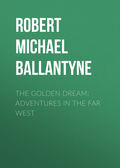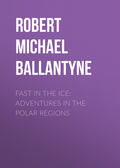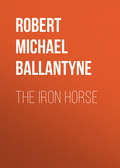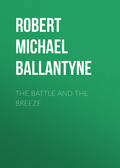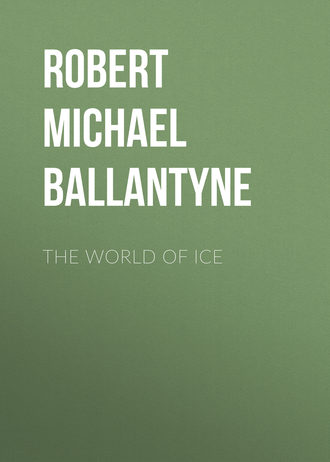
Robert Michael Ballantyne
The World of Ice
CHAPTER XXII
The "Arctic Sun"—Rats! rats! rats!–A hunting-party—Out on the floes—Hardships.
Among the many schemes that were planned and carried out for lightening the long hours of confinement to their wooden home in the Arctic Regions, was the newspaper started by Fred Ellice, and named, as we have already mentioned, the Arctic Sun.
It was so named because, as Fred stated in his first leading article, it was intended to throw light on many things at a time when there was no other sun to cheer them. We cannot help regretting that it is not in our power to present a copy of this well-thumbed periodical to our readers; but being of opinion that something is better than nothing, we transcribe the following extract as a specimen of the contributions from the forecastle. It was entitled—
JOHN BUZZBY'S OPPINYUNS O' THINGS IN GIN'RAL.
Mr. Editer,—As you was so good as to ax from me a contribootion to your waluable peeryoddical, I beg heer to stait that this heer article is intended as a gin'ral summery o' the noos wots agoin'. Your reeders will be glad to no that of late the wether's bin gittin' colder, but they'll be better pleased to no that before the middle o' nixt sumer it's likely to git a, long chawk warmer. There's a gin'ral complaint heer that Mivins has bin eatin' the shuger in the pantry, an' that's wots makin' it needfull to put us on short allowance. Davie Summers sais he seed him at it, an' it's a dooty the guvermint owes to the publik to have the matter investigated. It's gin'rally expected, howsever, that the guvermint won't trubble its hed with the matter. There's bin an onusual swarmin' o' rats in the ship of late, an' Davie Summers has had a riglar hunt after them. The lad has becum more than ornar expert with his bow an' arrow, for he niver misses now—exceptin', always, when he dusn't hit—an' for the most part takes them on the pint on the snowt with his blunt-heded arow, which he drives in—the snowt, not the arow. There's a gin'ral wish among the crew to no whether the north pole is a pole or a dot. Mizzle sais it's a dot, and O'Riley swears (no, he don't do that, for we've gin up swearin' in the fog-sail), but he sais that it's a real post, 'bout as thick again as the main-mast, an' nine or ten times as hy. Grim sais it's nother wun thing nor anuther, but a hydeear that is sumhow or other a fact, but yit don't exist at all. Tom Green wants to no if there's any conexshun between it an' the pole that's conected with elections. In fact, we're all at sea, in a riglar muz abut this, an' as Dr. Singleton's a syentiffick man, praps he'll give us a leadin' article in your nixt—so no more at present from— Yours to command,
JOHN BUZZBY.
This contribution was accompanied with an outline illustration of Mivins eating sugar with a ladle in the pantry, and Davie Summers peeping in at the door—both likenesses being excellent.
Some of the articles in the Arctic Sun were grave and some were gay, but all of them were profitable, for Fred took care that they should be charged either with matter of interest or matter provocative of mirth. And, assuredly, no newspaper of similar calibre was ever looked forward to with such expectation, or read and re-read with such avidity. It was one of the expedients that lasted longest in keeping up the spirits of the men.
The rat-hunting referred to in the foregoing "summary" was not a mere fiction of Buzzby's brain. It was a veritable fact. Notwithstanding the extreme cold of this inhospitable climate, the rats in the ship increased to such a degree that at last they became a perfect nuisance. Nothing was safe from their attacks—whether substances were edible or not, they were gnawed through and ruined—and their impudence, which seemed to increase with their numbers, at last exceeded all belief. They swarmed everywhere—under the stove, about the beds, in the lockers, between the sofa cushions, amongst the moss round the walls, and inside the boots and mittens (when empty) of the men. And they became so accustomed to having missiles thrown at them, that they acquired to perfection that art which Buzzby described as "keeping one's weather-eye open."
You couldn't hit one if you tried. If your hand moved towards an object with which you intended to deal swift destruction, the intruder paused, and turned his sharp eyes towards you, as if to say, "What! going to try it again?—come, then, here's a chance for you." But when you threw, at best you could only hit the empty space it had occupied the moment before. Or, if you seized a stick, and rushed at the enemy in wrath, it grinned fiercely, showed its long white teeth, and then vanished with a fling of its tail that could be construed into nothing but an expression of contempt.
At last an expedient was hit upon for destroying these disagreeable inmates. Small bows and arrows were made, the latter having heavy, blunt heads, and with these the men slaughtered hundreds. Whenever any one was inclined for a little sport, he took up his bow and arrows, and retiring to a dark corner of the cabin, watched for a shot. Davie Summers acquired the title of Nimrod in consequence of his success in this peculiar field.
At first the rats proved a capital addition to the dogs' meals, but at length some of the men were glad to eat them, especially when fresh meat failed altogether, and scurvy began its assaults. White or Arctic foxes, too, came about the ship sometimes in great numbers, and proved an acceptable addition to their fresh provisions; but at one period all these sources failed, and the crew were reduced to the utmost extremity, having nothing to eat except salt provisions. Notwithstanding the cheering influence of the sun, the spirits of the men fell as their bodily energies failed. Nearly two-thirds of the ship's company were confined to their berths. The officers retained much of their wonted health and vigour, partly in consequence, no doubt, of their unwearied exertions in behalf of others. They changed places with the men at last, owing to the force of circumstances—ministering to their wants, drawing water, fetching fuel, and cooking their food—carrying out, in short, the divine command, "By love serve one another."
During the worst period of their distress a party was formed to go out upon the floes in search of walruses.
"If we don't get speedy relief," remarked Captain Guy to Tom Singleton in reference to this party, "some of us will die. I feel certain of that. Poor Buzzby seems on his last legs, and Mivins is reduced to a shadow."
The doctor was silent, for the captain's remark was too true.
"You must get up your party at once, and set off after breakfast, Mr. Bolton," he added, turning to the first mate. "Who can accompany you?"
"There's Peter Grim, sir; he's tough yet, and not much affected by scurvy. And Mr. Saunders, I think, may—"
"No," interrupted the doctor, "Saunders must not go. He does not look very ill, and I hope is not, but I don't like some of his symptoms."
"Well, doctor, we can do without him. There's Tom Green and O'Riley. Nothing seems able to bring down O'Riley. Then there's—"
"There's Fred Ellice," cried Fred himself, joining the group; "I'll go with you if you'll take me."
"Most happy to have you, sir. Our healthy hands are very short, but we can muster sufficient, I think."
The captain suggested Amos Parr and two or three more men, and then dismissed his first mate to get ready for an immediate start.
"I don't half like your going, Fred," said his father. "You've not been well lately, and hunting on the floes, I know from experience, is hard work."
"Don't fear for me, father; I've quite recovered from my recent attack, which was but slight after all, and I know full well that those who are well must work as long as they can stand."
"Ho, lads! look alive there! are you ready?" shouted the first mate down the hatchway.
"Ay, ay, sir," replied Grim, and in a few minutes the party were assembled on the ice beside the small sledge with their shoulder-belts on, for most of the dogs were either dead or dying of that strange complaint to which allusion has been made in a previous chapter.
They set out silently, but ere they had got a dozen yards from the ship Captain Guy felt the impropriety of permitting them thus to depart.
"Up, lads, and give them three cheers!" he cried, mounting the ship's side and setting the example.
A hearty, generous spirit, when vigorously displayed, always finds a ready response from human hearts. The few sailors who were on deck at the time, and one or two of the sick men who chanced to put their heads up the hatchway, rushed to the side, waved their mittens—in default of caps—and gave vent to three hearty British cheers. The effect on the drooping spirits of the hunting-party was electrical. They pricked up like chargers that had felt the spur, wheeled round, and returned the cheer with interest. It was an apparently trifling incident, but it served to lighten the way and make it seem less dreary for many a long mile.
"I'm tired of it intirely," cried O'Riley, sitting down on a hummock, on the evening of the second day after setting out on the hunt; "here we is, two days out, an' not a sign o' life nowhere."
"Come, don't give in," said Bolton cheerfully; "we're sure to fall in with a walrus to-day."
"I think so," cried Fred; "we have come so far out upon the floes that there must be open water near."
"Come on, then," cried Peter Grim; "don't waste time talking."
Thus urged O'Riley rose, and throwing his sledge-strap over his shoulder, plodded on wearily with the rest.
Their provisions were getting low now, and it was felt that if they did not soon fall in with walruses or bears they must return as quickly as possible to the ship in order to avoid starving. It was therefore a matter of no small satisfaction that, on turning the edge of an iceberg, they discovered a large bear walking leisurely towards them. To drop their sledge-lines and seize their muskets was the work of a moment. But, unfortunately, long travelling had filled the pans with snow, and it required some time to pick the touch-holes clear. In this extremity Peter Grim seized a hatchet and ran towards the bear, while O'Riley charged it with a spear. Grim delivered a tremendous blow at its head with his weapon; but his intention was better than his aim, for he missed the bear and smashed the corner of a hummock of ice. O'Riley was more successful. He thrust the spear into the animal's shoulder; but the shoulder-blade turned the head of the weapon, and caused it to run along at least three feet just under the skin. The wound, although not fatal, was so painful that Bruin uttered a loud roar of disapproval, wheeled round, and ran away!–an act of cowardice so unusual on the part of a Polar bear that the whole party were taken by surprise. Several shots were fired after him, but he soon disappeared among the ice-hummocks, having fairly made off with O'Riley's spear.
The disappointment caused by this was great, but they had little time to think of it, for soon after a stiff breeze of wind sprang up, which freshened into a gale, compelling them to seek the shelter of a cluster of icebergs, in the midst of which they built a snow-hut. Before night a terrific storm was raging, with the thermometer 40° below zero. The sky became black as ink, drift whirled round them in horrid turmoil, and the wild blast came direct from the north, over the frozen sea, shrieking and howling in its strength and fury.
All that night and the next day it continued. Then it ceased, and for the first time that winter a thaw set in, so that ere morning their sleeping-bags and socks were thoroughly wetted. This was of short duration, however. In a few hours the frost set in again as intense as ever, converting all their wet garments and bedding into hard cakes of ice. To add to their misfortunes their provisions ran out, and they were obliged to abandon the hut and push forward towards the ship with the utmost speed. Night came on them while they were slowly toiling through the deep drifts that the late gale had raised, and to their horror they found they had wandered out of their way, and were still but a short distance from their snow-hut. In despair they returned to pass the night in it, and spreading their frozen sleeping-bags on the snow, they lay down, silent and supperless, to rest till morning.
CHAPTER XXIII
Unexpected arrivals—The rescue party—Lost and found—Return to the ship.
The sixth night after the hunting-party had left the ship, Grim and Fred Ellice suddenly made their appearance on board. It was quite dark, and the few of the ship's company who were able to quit their berths were seated round the cabin at their meagre evening meal.
"Hallo, Fred!" exclaimed Captain Ellice, as his son staggered rather than walked in and sank down on a locker. "What's wrong, boy? where are the rest of you?"
Fred could not answer; neither he nor Grim was able to utter a word at first. It was evident that they laboured under extreme exhaustion and hunger. A mouthful of hot soup administered by Tom Singleton rallied them a little, however.
"Our comrades are lost, I fear."
"Lost!" exclaimed Captain Guy. "How so? Speak, my boy; but hold, take another mouthful before you speak. Where did you leave them, say you?"
Fred looked at the captain with a vacant stare. "Out upon the ice to the north; but, I say, what a comical dream I've had!" Here he burst into a loud laugh. Poor Fred's head was evidently affected, so his father and Tom carried him to his berth.
All this time Grim had remained seated on a locker swaying to and fro like a drunken man, and paying no attention to the numerous questions that were put to him by Saunders and his comrades.
"This is bad!" exclaimed Captain Guy, pressing his hand on his forehead.
"A search must be made," suggested Captain Ellice. "It's evident that the party have broken down out on the floes, and Fred and Grim have been sent to let us know."
"I know it," answered Captain Guy. "A search must be made, and that instantly, if it is to be of any use; but in which direction are we to go is the question. These poor fellows cannot tell us. 'Out on the ice to the north' is a wide word.—Fred, Fred, can you not tell us in which direction we ought to go to search for them?"
"Yes, far out on the floes—among hummocks—far out," murmured Fred, half unconsciously.
"We must be satisfied with that. Now, Mr. Saunders, assist me to get the small sledge fitted out. I'll go to look after them myself."
"An' I'll go with 'ee, sir," said the second mate promptly.
"I fear you are hardly able."
"No fear o' me, sir. I'm better than 'ee think."
"I must go too," added Captain Ellice; "it is quite evident that you cannot muster a party without me."
"That's impossible," interrupted the doctor. "Your leg is not strong enough nearly for such a trip; besides, my dear sir, you must stay behind to perform my duties, for the ship can't do without a doctor, and I shall go with Captain Guy, if he will allow me."
"That he won't," cried the captain. "You say truly the ship cannot be left without a doctor. Neither you nor my friend Ellice shall leave the ship with my permission. But don't let us waste time talking.—Come, Summers and Mizzle, you are well enough to join, and, Meetuck, you must be our guide. Look alive and get yourselves ready."
In less than half-an-hour the rescue party were equipped and on their way over the floes. They were six in all—one of the freshest among the crew having volunteered to join those already mentioned.
It was a very dark night, and bitterly cold; but they took nothing with them except the clothes on their backs, a supply of provisions for their lost comrades, their sleeping-bags, and a small leather tent. The captain also took care to carry with them a flask of brandy.
The colossal bergs, which stretched like well-known land-marks over the sea, were their guides at first; but after travelling ten hours without halting, they had passed the greater number of those with which they were familiar, and entered upon an unknown region. Here it became necessary to use the utmost caution. They knew that the lost men must be within twenty miles of them, but they had no means of knowing the exact spot, and any footprints that had been made were now obliterated. In these circumstances Captain Guy had to depend very much on his own sagacity.
Clambering to the top of a hummock, he observed a long stretch of level floe to the northward.
"I think it likely," he remarked to Saunders, who had accompanied him, "that they may have gone in that direction. It seems an attractive road among this chaos of ice-heaps."
"I'm no sure o' that," objected Saunders; "yonder's a pretty clear road away to the west, maybe they took that."
"Perhaps they did, but as Fred said they had gone far out on the ice to the north, I think it likely they've gone in that direction."
"Maybe ye're right, sir, and maybe ye're wrang," answered Saunders, as they returned to the party. As this was the second mate's method of intimating that he felt that he ought to give in (though he didn't give in, and never would give in absolutely), the captain felt more confidence in his own opinion.
"Now, Meetuck, keep your eyes open," he added, as they resumed their rapid march.
After journeying on for a considerable distance, the men were ordered to spread out over the neighbouring ice-fields, in order to multiply the chances of discovering tracks; but there seemed to be some irresistible power of attraction which drew them gradually together again, however earnestly they might try to keep separate. In fact, they were beginning to be affected by the long-continued march and the extremity of the cold.
This last was so great that constant motion was absolutely necessary in order to prevent them from freezing. There was no time allowed for rest—life and death were in the scale. Their only hope lay in a continuous and rapid advance, so as to reach the lost men ere they should freeze or die of starvation.
"Holo! look 'eer!" shouted Meetuck, as he halted and went down on his knees to examine some marks on the snow.
"These are tracks!" cried Captain Guy eagerly. "What think you, Saunders?"
"They look like it"
"Follow them up, Meetuck. Go in advance, my lad, and let the rest of you scatter again."
In a few minutes there was a cry heard, and as the party hastened towards the spot whence it came, they found Davie Summers pointing eagerly to a little snow-hut in the midst of a group of bergs.
With hasty steps they advanced towards it, and the captain, with a terrible misgiving at heart, crept in.
"Ah! then, is it yerself, darlint?" were the first words that greeted him.
A loud cheer from those without told that they heard and recognized the words. Immediately two of them crept in, and striking a light, kindled a lamp, which revealed the care-worn forms of their lost comrades stretched on the ground in their sleeping-bags. They were almost exhausted for want of food, but otherwise they were uninjured.
The first congratulations over, the rescue party immediately proceeded to make arrangements for passing the night. They were themselves little better than those whom they had come to save, having performed an uninterrupted march of eighteen hours without food or drink.
It was touching to see the tears of joy and gratitude that filled the eyes of the poor fellows, who had given themselves up for lost, as they watched the movements of their comrades while they prepared food for them; and the broken, fitful conversation was mingled strangely with alternate touches of fun and deep feeling, indicating the conflicting emotions that struggled in their breasts.
"I knowed ye would come, captain; bless you, sir," said Amos Parr, in an unsteady voice.
"Come! Av coorse ye knowed it," cried O'Riley energetically. "Och, but don't be long wid the mate, darlints, me stummik's shut up intirely."
"There won't be room for us all here, I'm afraid," remarked Bolton.
This was true. The hut was constructed to hold six, and it was impossible that ten could sleep in it, although they managed to squeeze in.
"Never mind that," cried the captain. "Here, take a drop of soup; gently, not too much at a time."
"Ah, then, it's cruel of ye, it is, to give me sich a small taste."
It was necessary, however, to give men in their condition a "small taste" at first, so O'Riley had to rest content. Meanwhile, the rescue party supped heartily, and after a little more food had been administered to the half-starved men, preparations were made for spending the night. The tent was pitched, and the sleeping-bags spread out on the snow. Then Captain Guy offered up fervent thanks to God for his protection thus far, and prayed shortly but earnestly for deliverance from their dangerous situation; after which they all lay down and slept soundly till morning—or at least as soundly as could be expected with a temperature at 55° below zero.
Next morning they prepared to set out on their return to the ship. But this was no easy task. The exhausted men had to be wrapped up carefully in their blankets, which were sewed closely round their limbs, then packed in their sleeping-bags and covered completely up, only a small hole being left opposite their mouths to breathe through, and after that they were lashed side by side on the small sledge. The larger sledge, with the muskets, ammunition, and spare blankets, had to be abandoned. Then the rescue party put their shoulders to the tracking-belts, and away they went briskly over the floes.
But the drag was a fearfully heavy one for men who, besides having walked so long and so far on the previous day, were, most of them, much weakened by illness, and very unfit for such laborious work. The floes, too, were so rugged that they had frequently to lift the heavy sledge and its living load over deep rents and chasms which, in circumstances less desperate, they would have scarcely ventured to do. Work as they would, however, they could not make more than a mile an hour, and night overtook them ere they reached the level floes. But it was of the utmost importance that they should continue to advance, so they pushed forward until a breeze sprang up that pierced them through and through.
Fortunately there was a bright moon in the sky, which enabled them to pick their way among the hummocks. Suddenly, without warning, the whole party felt an alarming failure of their energies. Captain Guy, who was aware of the imminent danger of giving way to this feeling, cheered the men to greater exertion by word and voice, but failed to rouse them. They seemed like men walking in their sleep.
"Come, Saunders, cheer up, man!" cried the captain, shaking the mate by the arm; but Saunders stood still, swaying to and fro like a drunken man. Mizzle begged to be allowed to sleep, if it were only for two minutes, and poor Davie Summers deliberately threw himself down on the snow, from which, had he been left, he would never more have risen.
The case was now desperate. In vain the captain shook and buffeted the men. They protested that they did not feel cold—"they were quite warm, and only wanted a little sleep." He saw that it was useless to contend with them, so there was nothing left for it but to pitch the tent.
This was done as quickly as possible, though with much difficulty, and the men were unlashed from the sledge and placed within the tent. The others then crowded in, and falling down beside each other were asleep in an instant. The excessive crowding of the little tent was an advantage at this time, as it tended to increase their animal heat. Captain Guy allowed them to sleep only two hours, and then roused them in order to continue the journey; but short though the period of rest was, it proved sufficient to enable the men to pursue their journey with some degree of spirit. Still it was evident that their energies had been overtaxed; for when they neared the ship next day, Tom Singleton, who had been on the look-out, and advanced to meet them, found that they were almost in a state of stupor, and talked incoherently—sometimes giving utterance to sentiments of the most absurd nature with expressions of the utmost gravity.
Meanwhile, good news was brought them from the ship. Two bears and a walrus had been purchased from the Esquimaux, a party of whom—sleek, fat, oily, good-humoured, and hairy—were encamped on the lee side of the Dolphin, and were busily engaged in their principal and favourite occupation—eating!



